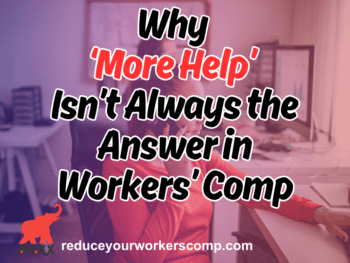
But by utilizing compassion and empathy and, perhaps most importantly — involving those closest to the person, even the most hesitant injured worker may agree to a settlement that is fair to all players.
Why Not Settle
Workers’ compensation stakeholders are often baffled as to why an injured worker who has been in the system for years just doesn’t want to settle. The claims adjuster may routinely ask the injured worker if she would consider settling, only to get a firm ‘no.’ Too often, that is the end of the conversation.
Injured workers certainly have many reasons for wanting to settle their claims and get out of the workers’ compensation system, such as:
- Freedom from having to get the OK about every medical procedure, medication, and decision
- Freedom to choose which providers to see
- Freedom from unwarranted denials
Click Link to Access Free PDF Download
“8 ‘Think Outside the Box’ Tactics to Settle Workers’ Comp Claims”
On the surface, it seems like settling is far more advantageous than staying in the workers’ compensation system. Putting yourself in the shoes of the injured worker can provide insights into why an injured worker would not want to settle. Along with the freedom from restrictions of the workers’ compensation system comes great responsibility, to:
- Navigate a complex healthcare system
- Locate all necessary providers
- Ensure settlement funds are spent appropriately and don’t run out
- Comply with various government regulations
- Make all medical decisions without the support of a nurse case manager or case adjuster
- Pay out of pocket for any treatment or services not covered by Medicare when a Medicare Set Aside is involved
- Find the best care that is also the most cost-effective
But the biggest reason many injured workers are reluctant to settle their claims is fear of change. Especially for those who have been in the system for years, the alternative may seem much more frightening.
Change the Conversation
Simply asking an injured worker ‘if’ she would consider settling, then ending the conversation after she says ‘no’ does nothing to move the needle forward, especially if the adjuster has asked the same question and received the same answer over and over.
Instead, the question could be asked differently — again, putting oneself in the shoes of the injured worker would help. ‘What would make you consider discussing a claim settlement?’ is a better approach. Or, instead of just ending the conversation when the injured worker says ‘no,’ follow it up with, ‘why?’ Perhaps even better would be to ask something like, ‘what are your biggest concerns about settling your claim?’ or, ‘if you were to settle your claim, what do you think you would need going forward?’
These questions might persuade the injured worker to at least open up about why she is intent on not settling. It might also cause her to think about it in ways she has not.
It’s also important to have the right party asking such questions and providing the right resources to transition them to life after settlement. Ideally, it should be a neutral third party whose sole purpose is to work with the injured worker and act as a buffer to other stakeholders. Professional administrators are increasingly taking on this role.
Professional administrators work with the injured worker post-settlement. They help the person navigate the healthcare process, comply with Medicare and other government entities, and provide support throughout the injured worker’s life. While they work hand in hand with many stakeholders involved, their allegiance is to the injured worker.
Early involvement
Part of getting an injured worker to discuss settling his claim is allaying his fears. The process should be done carefully and in a way that uncovers and addresses the injured worker’s concerns and needs. Bringing in a professional administrator before settlement discussions are underway, for example when the injured worker is getting near the end of their active treatment or has reached Maximum Medical Improvement status, can make the difference between closing or not closing the claim.
Professional administrators should spend time getting to know the injured worker and his family. Once the injured worker understands this person is there solely to help him if and when he settles, he is much more likely to open up.
Getting a professional administrator involved in legacy claims can help determine what obstacles there might be and set the groundwork for a fair and appropriate settlement.
Importance of Family
An injury does not affect only the person who sustains it; in most cases, it has implications for the person’s family, coworkers, and friends. The responsibilities of the injured person may be suddenly thrust onto others. Whether it’s childcare obligations, cleaning and cooking, picking up groceries, driving elders to appointments or generating the primary income, the injured person’s commitments may need to be spread around. The lives of many people are upended when someone becomes seriously injured.
Unfortunately, the workers’ compensation system typically does not provide all the support family members may need, often leading to breakups. A settlement should be coordinated in a manner that accounts for the medical needs relating to an injured individual’s injury that may impact their family after settlement, such as providing funds that cover the family’s expenses to take care of the injured individual at home. Accounting for medical needs that may not be covered by Medicare after settlement can provide the family relief knowing that settlement funds have been allocated to account for expenses like these.
This may include money for such things as:
- Medications not included in the MSA (if they are not covered by a spouse’s group health plan)
- The expenses associated with a family member attending to the care of the injured worker or for the family to pay for an attendant
- Relief for family members upon death
- Home or car modifications that are not covered by Medicare
- Health plans to assist with additional coverage including, Medicare Advantage Plans and Medi-gap plans
Such information can be integrated into the settlement agreement to ensure all such needs are covered.
A professional administrator can ensure an injured individuals’ medical funds are managed to account for medical needs impacting family caregivers, including out-of-pocket expenses for medical items and services not covered by Medicare. The administrator can help provide additional savings through their large provider networks, helping extend the lifetime of the funds.
Also, it’s especially important that the injured worker’s family is involved in conversations about what changes to expect once the claim is settled. They need to understand that there will be changes, but that working with a professional administrator can greatly help to smooth the transition to post-settlement life.
An administrator can help address common settlement fears by speaking with an injured worker’s family directly, to better understand the family’s specific needs and concerns. Having an administrator work closely in a settlement with both the injured worker and their family helps them both to feel more comfortable about closing their open medical claim.
A professional administrator can simplify an injured worker and their family’s life after settlement through:
- Managing Medical Billing – an administrator will manage all medical payments related to the injury so the individual or their family members will never have to touch a bill
- Meeting Medicare Reporting Requirements – in the case of a Medicare Set Aside, the administrator reports all expenses related to the injury to protect the individual’s Medicare benefits in the case the funds are exhausted. This means no complicated reporting tasks for the individual or their family.
- Medical Discounts – administrators typically work with a variety of providers and pharmacies to offer significant discounts to help preserve the individual’s settlement funds
- Durable Medical Equipment (DME) Support – an administrator can support an injured individual and their family in finding and purchasing DME including modified vehicles, adaptive equipment for current vehicles, and helping with home modifications
Conclusion
Injured workers with long-term claims may be frustrated, angry, and untrusting. The idea of ‘settling’ their claims may seem like a ploy by stakeholders who don’t care about them. Having an advocate working with them and involving their family can be a game-changer for many of these workers.

Porter Leslie is the CEO of Ametros. Porter directs the growth of Ametros and works with its many partners and clients. He built his career leading customer-focused businesses in the healthcare and financial services industries. Prior to Ametros, Porter worked in investment banking, private equity and corporate development.
Porter earned a B.A. in Economics from Columbia University, as well as an MBA from the Wharton School and an M.A. from the Lauder Institute at the University of Pennsylvania. Porter is fluent in Spanish and Portuguese and resides in Boston with his wife and two children.



























